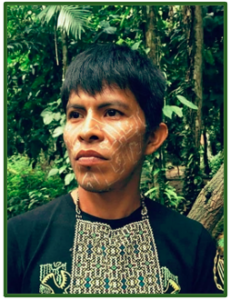© 2024 Svetlana Yurievna SAVELYEVA, Rider AREVALO OCHAVANO
2024 – № 1 (27)
DOI: https://doi.org/10.33876/2224-9680/2024-1-27/09
For citation:
Savelyeva S.Yu., Arevalo Ochavano R. (2024) Shipibo Natural Medicine in the XXI century, Medical Anthropology and Bioethics, 1(27).
philologist;
practical psychologist
of the transpersonal approach;
certified presenter
of holotropic breathwork
according to the international GTT program
(Grof Transpersonal Training);
(Moscow)
E-mail: snowsstorms@yandex.ru
(Sp. Rider Arevalo Ochavano) –
A healer from a clan of
hereditary Shipibo curanderos;
Director
of the Moyano Natural Medicine Center;
(Tingo Maria / Tingo María: Peru)
E-mail: arevalorider98@gmail.com
Keywords: curandero, shamanism, shipibo, traditional folk medicine of Peru, ayahuasca, plant teachers, psychological help and support, inner transformation, awareness
Abstract. Since ancient times, shamans of the Shipibo-Conibo Indian tribe in Peru have been using the Ayahuasca drink in medicine to heal both physical and mental ailments. The Ayahuasca creeper is revered as a national treasure, the drink of the same name made from it recognized as a source of natural knowledge. Ayahuasca has become a cultural heritage of Peru and has the official status of ‘traditional medicine’ (folk medicine). More and more people in the Western world have begun to show interest in the psychophysiological and healing experience it provides. However, shamans insist that as a sacred spirit and a drink of power, Ayahuasca should be used in mystical and magical mysteries, and like any other healing remedy, in rituals and ceremonies aimed at healing ailments, as well as serious internal psychological work. The curanderos are interested in preserving and protecting the “sacred ceremony of Ayahuasca” and its status. One of them, maestro Rider Arevalo Ochavano, is a practitioner who conducts Ayahuasca ceremonies and also studies the properties of various plants that can help in medicine. Maestro Rider followed strict diets with teacher-plants, studied communication with nature spirits in the Amazon jungle, and mastered various methods of treatment. This paper discusses the issues of modern attitudes towards traditional medicine in Peru; research conducted on plants the curanderos call teacher-plants; the psychological side of the issue when working with patients, internal transformation during sessions. The topic of comparing shamanic cultures in Peru and other countries is touched upon.
References
Alekseev, N.A. (1984) Shamanizm tyurkoyazychnykh narodov Sibiri (opyt areal’nogo sravnitel’nogo issledovaniya) [Shamans and their religious practices: from Shamanism among the Turkic Peoples of Siberia], Novosibirsk: Nauka.
Amaringo, P. (2018) Videniya peruanskogo shamana [The Ayahuasca Visions of Pablo Amaringo], Moscow: Eksmo.
Kharitonova, V.I. (1990) Chornaya i belaya magiya slavyan [Black and white magic of the Slavic people], Moscow: Interbook.
McKenna, T. (1995) Food of the Gods: The Search for the Original Tree of Knowledge – A Radical History of Plants, Drugs, and Human Evolution, New York: Bantam.
Nietzsche, F. (2016) Chelovecheskoye, slishkom chelovecheskoye. Kniga dlya svobodnykh umov [Human, All Too Human: A Book for Free Spirits], Moscow: Eksmo.
Potter B., Orfali S. (1997) Brain Boosters – Foods & Drugs that make you smarter, Berkеley: Ronin Publishing, INC.
Shamanizm i ranniye religioznyye predstavleniya (1995) Sbornik k 90-letiyu L.P. Potapova, D.A. Funk (otv. redaktor) [Shamanism and early religious beliefs. Collected works for the 90th anniversary of M.P. Potapov, D.A. Funk (lead editor)] [Etnologicheskiye issledovaniya po shamanstvu i inym rannim verovaniyam i praktikam T. 1] [Ethnological studies of Shamanism and Other Indigenous Spiritual Beliefs and Practices, Vol. 1], Moscow: IEA RAS (Institute of Ethnology and Anthropology of the Russian Academy of Sciences).
Sombrun, C. (2006) Dnevnik uchenitsy shamana [Journal of A Shaman’s Apprentice], Moscow: Fluid / FreeFly.
Vishnevsky M.V. (2023) Ego Velichestvo muxomor [His Majesty the Fly Agaric], Moscow: Prospekt.
Xenofontov G.V. (1992) Shamanism. Izbrannyye trudy [Shamanism. Selected works], Moscow: Sever-Yug.

